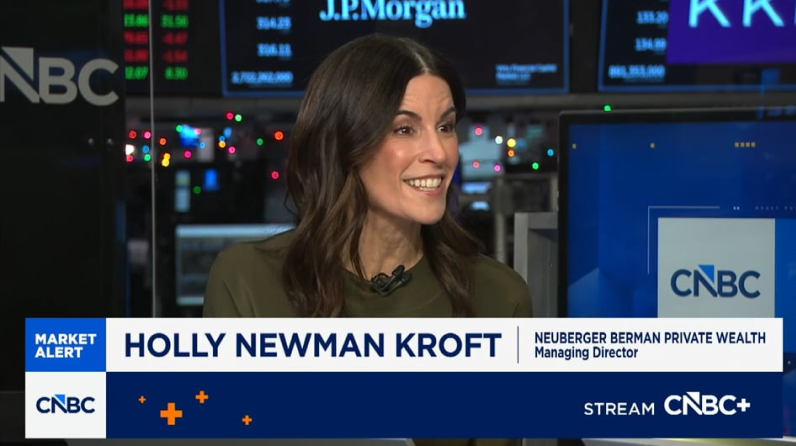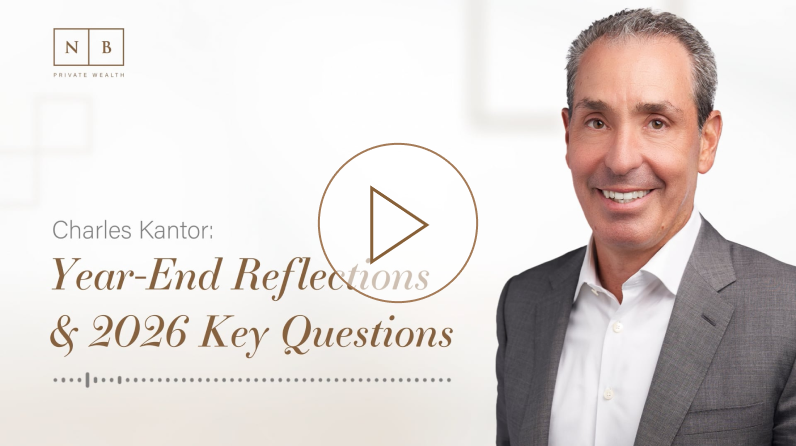

Stephanie Luedke was recently featured in Barron’s to commemorate her 5 years at NB Private Wealth.
When she took the reins as the head of Neuberger Berman’s private wealth business in mid-2019, Stephanie Birrell Luedke chose to make a big change in her leadership approach. “I made a conscious decision to be myself, to be more open about who I was, and to embrace the fact that I was a female leader,” she says.
Speaking with Barron’s Advisor, the New England native talks about important hires, rebranding, and other accomplishments in her five years leading the business, where assets under management have grown to $74 billion from $47 billion shortly before her arrival. Luedke argues that surviving spouses, not offspring, are the “next generation” that advisors should focus on. A chartered financial analyst, she explains what a female leadership style means to her, and asserts that being open about being a working mother has helped the business attract talent.
Where are you from and how did you get into the wealth management business? I grew up in a very small college town, Williamstown, in northwestern Massachusetts, where Williams College is located. I went to St. Lawrence University, which is in even more rural upstate New York, and majored in math and economics. I wanted to go live in a city, I wanted to be in business. I grew up studying classical ballet, which takes a lot of drive and discipline and independence. And that has ended up being a theme throughout my life.
I was recruited by Coopers and Lybrand, one of the Big Six public accounting firms, and participated in a training program at the University of Southern California, where the idea was if they taught liberal-arts majors accounting, then we could go into audit engagements, engage more broadly with the organization, and find opportunities to do more work with them.
So I did two years of public accounting, which I did not love. But I had the opportunity to go inside different types of organizations, from the Boston Ballet to Laura Ashley to the company that makes Solo cups. When I went inside mutual fund companies in Boston and started auditing mutual funds, I thought, “Well this auditing thing is not very interesting, but it’s very cool to look at what they’re doing inside of these funds.” You know, I hadn’t grown up talking about the stock market at the dinner table. Then through networking, I started to understand the whole asset management industry, and that’s how I got in.
You joined Neuberger Berman five years ago, after having leadership roles at Citi Private Bank and Fiduciary Trust Co. What attracted you to the opportunity? I joined to leverage the incredible foundation and history the organization has, with an eye toward where the industry is going. That means making sure we’re evolving our capabilities and meeting our clients where they are and where they’re going, and ensuring that we continue to stay relevant, and we continue to have the expertise to deliver.
Right, Neuberger Berman’s private wealth business has been around for 85 years. What needs did you identify when you joined? One area of focus has been to ensure that we have what we need to provide ongoing wealth strategy, planning, and advice for our clients. Investing in our capabilities there has been a big part of what I’ve focused on. I brought in Sam Petrucci to run what we now refer to as advice, planning, and fiduciary services. We brought on Julia Chu to run philanthropic and family governance advisory. And we’ve deepened our bench in terms of wealth strategy and trust and estate planning.
Neuberger Berman has also evolved and innovated in investing over the past 15 years in remarkable ways. We have investment capabilities in equities, fixed income, and real estate across private and public markets. I think the notable part of what we have is the public/private mix. That will be increasingly relevant for our clients and is somewhat unique. We also offer access to third-party managers.
The third area of focus is around the client experience, how clients want to engage with their wealth manager, and how our next generation of clients want to engage with us. That means everything from making sure we’re providing a digital experience, but also creating space and time with our clients to just have fun, to engage with them around what matters to them. Back in the day, maybe that meant quarterly meetings to get an update on the portfolio’s market value and talk about a few stocks. The way we define client engagement now is much broader, much more holistic and robust.
We’ve spent considerable time around how we hold ourselves out to the marketplace, how we describe the ways we can engage with our clients and deliver solutions and outcomes they’re looking for. So that’s where the “NB Private Wealth” came in. We did a complete rebranding, a complete overhaul of our brand narrative, which we rolled out in 2022.
What are other important hires you’ve made? I’m very proud of the talent we’ve been able to attract. In addition to Sam Petrucci, we hired Shannon Saccocia as our chief investment officer for NB Private Wealth. And we have hired a number of what I think are best-in-class wealth advisors; we hadn’t done a lot of that in the years just before I joined.
Reaching the next generation of clients is a priority for many advisors to wealthy families. What’s your strategy? Yes, everybody’s talking about this. I like to remind everybody that our next gen is, first and foremost, the surviving spouse. And the vast majority of the time, that spouse is a she. We are focused on making sure we are well positioned with that next generation, and that’s important, because what she wants is potentially very different from what the primary client has wanted. And it’s also very similar to what younger generations want. So a lot of our work is around philanthropic advisory and family governance. These are things that matter very much to our next-generation client. And we’re starting to see a lot of success in our ability to retain assets as they pass to the next generation. We’re also making sure that our wealth-advisor teams and our client-facing teams have a diversity of skills and perspectives. Putting together teams with diverse sets of skills and perspectives is enabling us to better serve that next generation.
Can you say more about what matters to these surviving spouses? If you look at the data, what matters to the surviving spouse is planning for her next generation. It starts in estate planning, structuring the assets, making sure her loved ones are going to be taken care of, and oftentimes philanthropic interests as well.
We had a large prospective client couple come in recently; they’d had a significant liquidity event. When we started the meeting, the husband said, “I can only get my wife to come for five minutes. She’s not interested in this meeting. But I wanted her to be introduced and then we’ll carry on with the meeting.” We got started and said, “Well, what’s on your mind? What’s important to you? What is your purpose with the wealth that has just been created, and what are your intentions? What are your concerns, and what do you view as your opportunities?” And lo and behold, the wife, who was going to leave five minutes into the meeting, stayed for the entire meeting, was fully engaged, and opened up rather quickly. We spent a lot of time talking about those things, not about what percentage they wanted in large-cap stocks versus small-cap stocks.
It’s very interesting that when women survive their husbands, you have to readjust the plan. That’s a little depressing. It’s a challenge for our industry. Historically these relationships have been very unilateral between an advisor and a client. And that unilateral engagement has often been solely on the portfolio and the market. But all the data will tell you that’s not necessarily what the surviving spouse is going to care about. So we’re really focused on broadening those conversations. We would very much prefer to be having those conversations years in advance; that is absolutely our objective, and we have organized ourselves around making sure we are doing that.
Another crazy statistic is that the vast majority of women, roughly 70%, change their wealth advisor within 12 months of their spouse passing away. That statistic is the most depressing. In the first 12 months after losing this person they’ve spent decades building a life with, they go through the complex, difficult, labor-intensive process of changing their advisor. As a wealth advisor, if you don’t understand what that person needs in that moment, you’re at high risk of losing them.
A few months ago, you posted on your LinkedIn about how early in your career you were advised to stand out, not blend in, to avoid the trap that many professional women fall into. Can you talk about that? Earlier in my career, there were very few if any female role models. So I was of the mind that I should just blend in and do the work, because I don’t fit in here. What you don’t know about me because we’re on Zoom is that I am 5’11.” Blending into a bunch of guys is not my natural state. So when I made the pivot to Citi [Luedke joined Citi in 2012, leading the unit that would become Citi Investment Management. ], a very large global bank, I was advised to be myself, that I’d earned this opportunity in my career. So I made a conscious decision to be myself, to be more open about who I was, and to embrace the fact that I was a female leader. And I found that it was so much more fun, and I was so much more effective because I could be myself. At that time, I also started to have more female peers and female role models around me, and that was also helpful.
What’s an example of leading as a female? I hate to stereotype. But my personal style is to try to bring empathy to what I do. And part of how I do that is by listening a lot, getting to know your people, collaborating, seeking multiple points of view, and then communicating.
As a leader I set the strategic direction, and I’m responsible for getting us there. I have no problem being decisive. But then when I’m decisive, I think being transparent and communicative brings people along. People are like, “I get it—she thinks we can get there. I’m going to get on board. I’m going to follow her, and we’re going to do that.” So I personally think that some of those characteristics are female.
How has your being a working mom affected the culture of the organization you lead? I used to really compartmentalize my life. I never talked about anything in my private life in my professional realm. Now I’m the opposite. I am a working mom. I have a son, and he is about to turn 14. I care deeply about being able to be a present mom. And I say that out loud as a leader very intentionally. I do that because I want to create a culture where it’s OK to talk about those things. I think I have attracted talent because I’ve been able to say, “This is how I do it. You be you, I’m being me. I think we can all be successful.” I’ve worked incredibly hard in my career, and I expect my people to work hard and to deliver, but I’m not going to micromanage where, when, and how they’re working hard. And I think that affords them flexibility but also permission to be a working parent. I am focused on creating that type of culture.
Thanks, Stephanie.


VIDEO
The Kantor Group | Charles Kantor’s Year-End Reflections and Key Questions as We Head Into 2026

INSIGHTS
CIO Notebook: Dual Release of Delayed Non-Farm Payrolls Likely Supports Another Cut

INSIGHTS
Using Tax-Free Gifts for Wealth Transfer

INSIGHTS
CIO Notebook: Powell Plays the Middle as Fed Cuts Rates

MARKET COMMENTARY
Giving Thanks for Market Strength

INSIGHTS
CIO Notebook: September U.S. Non-Farm Payrolls Further Complicate the Narrative

VIDEO
Holly Newman Kroft Featured on CNBC’s Money Movers November 18
VIDEO
Plan for Peace of Mind with Our Estate Planning Organizer
MARKET COMMENTARY
Some Tricks, More Treats
INSIGHTS
CIO Notebook: Markets Rattled as Fed Leans Hawkish
REPLAY
Private Wealth Investment Outlook 4Q25
INSIGHTS
CIO Notebook: September Core CPI Comes in Late but Light
INSIGHTS
Charitable Fundraising: Moving Beyond Cash
This material is provided for informational purposes only and nothing herein constitutes investment, legal, accounting or tax advice, or a recommendation to buy, sell or hold a security. This material is general in nature and is not directed to any category of investors and should not be regarded as individualized, a recommendation, investment advice or a suggestion to engage in or refrain from any investment-related course of action. Any views or opinions expressed may not reflect those of the firm as a whole.
Neuberger Berman Investment Advisers LLC is a registered investment adviser. The “Neuberger Berman” name and logo are registered service marks of Neuberger Berman Group LLC.